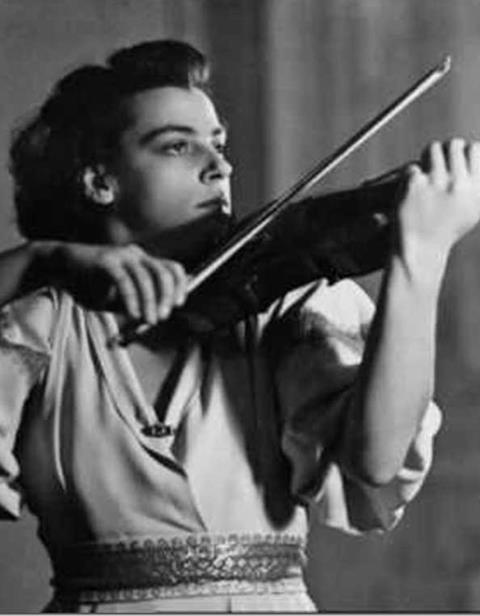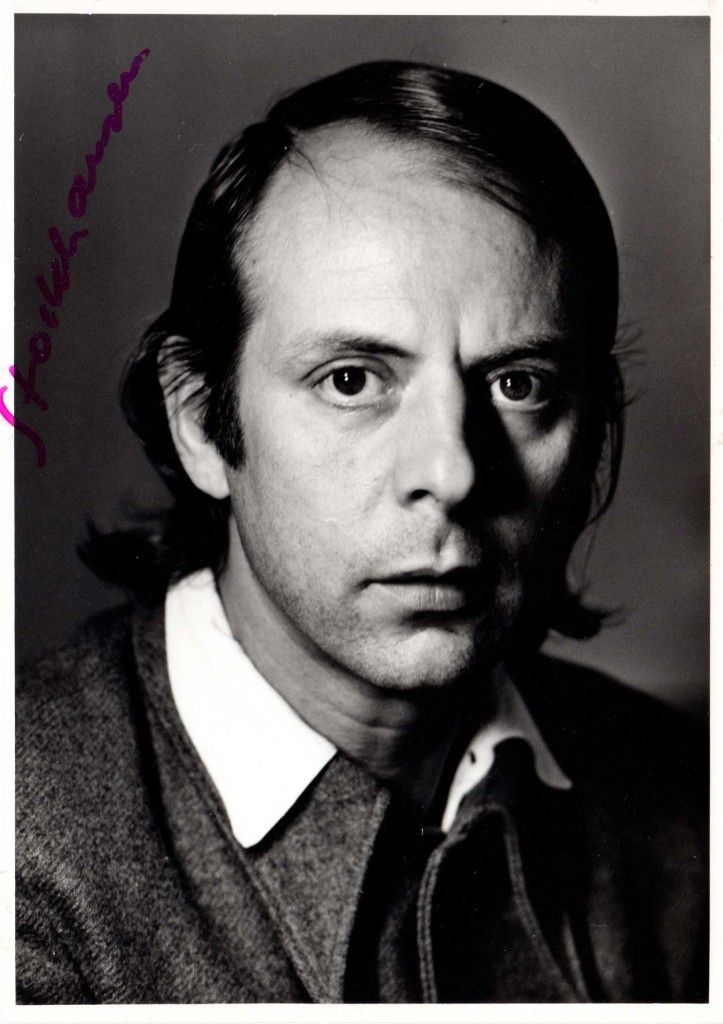This Week in Classical Music: August 16, 2021.Ginette Neveu and Karlheinz Stockhausen. Last week we promised to write about the violinist Ginette Neveu. The reason Neveu is not better known is because her life was tragically short. Neveu was born in Paris on August 11th of 1919. Her mother was Ginette’s first violin teacher. Ginette made her first public appearance at the age of seven playing Bruch's Violin Concerto no. 1 and later that same year performing Mendelssohn’s Violin Concerto with the Colonne Orchestra under the direction of Gabriel Pierné. She studied at the Paris Conservatory, receiving a premier prix at the age of 11, and then continued with George Enescu and the Hungarian teacher and violinist Carl Flesch (among Flesch’s pupils were Ivry Gitlis, Ida Haendel, Josef Hassid and Henryk Szeryng). In 1935, aged 15, Neveu won the International Wieniawski Competition; David Oistrakh, who was 11 years her older, took the second place and another Flesch’s pupil, Henri Temianka, took the third prize. Boris Goldstein, then 12 years old, came in the fourth. The Wieniawski win opened all major concert halls for Neveu: after the competition she toured Poland and Germany, then went to the Soviet Union, in 1937 she performed in the United States and Canada. During WWII, Neveu performed very few concerts, all of them in the occupied France (she refused to perform in Germany). In 1946 she played her debut concert in London and a year later – in South and North America. After hearing her perform Beethoven’s Violin Concerto in the first half of a concerts at the Royal Albert Hall, Queen Elizabeth invited Neveu to the royal box for the second half. But it was not just the royal fans who admired her: music critics all over the world praised her playing. Sibelius called Neveu’s performance of his Violin Concerto “extremely sensitive” and “unforgettable.”
On October 27th of 1949 she and her brother, a pianist who accompanied her in many concerts, were on their way from Paris to New York when their plane crashed near the Azores.Everybody on board was killed; her Stradivari was destroyed.Ginette Neveu was thirty when she died.Here’s a recording of Sibelius’s Violin Concerto that so impressed the composer.It was made on November 21st of 1945.Walter Süsskind leads the Philharmonia Orchestra.
Karlheinz Stockhausen was born on August 22nd of 1928 in Burg Mödrath, near Cologne.We often mention his name, and always somewhat anxiously: Stockhausen’s music is often very difficult.He was one of the most important composers of the second half of the 20th century, expanding serial composition technique with aleatory, or chance, elements.In the 1950s he was (along with Pierre Boulez and Luigi Nono) one of the most influential figures in the Darmstadt Summer Courses.What is interesting (and, by today’s standards, quite incredible) is that in the 1960s he was the second most recorded composer of the 20th century, after Stravinsky.In the 1970s Stockhausen was appointed professor of composition at the Cologne Musikhochschule.Also in the 1970s Stockhausen started working on his magnum opus. a cycle of seven operas Licht (Light), subtitled "Die sieben Tage der Woche" (The Seven Days of the Week).It was completed in 2003 and consists of 29 hours of music.
Of the three Stockhausen’s pieces in our library, two received “one note,” the lowest rating.Still, we’d like to offer our more adventuresome listeners an early piece called Kreuzspiel (here).It’s not very complicated and, we think, is a lot of fun.Kreuzspiel is performed by the Netherland-based Ives Ensemble.
Neveu and Stockhausen, 2021
This Week in Classical Music: August 16, 2021. Ginette Neveu and Karlheinz Stockhausen. Last week we promised to write about the violinist Ginette Neveu. The reason Neveu is not better known is because her life was tragically short. Neveu was born in Paris on August 11th of 1919. Her mother was Ginette’s first violin teacher. Ginette made her first public appearance at the age of seven playing Bruch's Violin Concerto no. 1 and later that same year performing Mendelssohn’s Violin Concerto with the Colonne Orchestra under the direction of Gabriel Pierné. She studied at the Paris Conservatory, receiving a premier prix at the age of 11, and then continued with George Enescu and the Hungarian teacher and violinist Carl Flesch (among Flesch’s pupils were Ivry Gitlis, Ida Haendel, Josef Hassid and Henryk Szeryng). In 1935, aged 15, Neveu won the International Wieniawski Competition; David Oistrakh, who was 11 years her older, took the second place and another Flesch’s pupil, Henri Temianka, took the third prize. Boris Goldstein, then 12 years old, came in the fourth. The Wieniawski win opened all major concert halls for Neveu: after the competition she toured Poland and Germany, then went to the Soviet Union, in 1937 she performed in the United States and Canada. During WWII, Neveu performed very few concerts, all of them in the occupied France (she refused to perform in Germany). In 1946 she played her debut concert in London and a year later – in South and North America. After hearing her perform Beethoven’s Violin Concerto in the first half of a concerts at the Royal Albert Hall, Queen Elizabeth invited Neveu to the royal box for the second half. But it was not just the royal fans who admired her: music critics all over the world praised her playing. Sibelius called Neveu’s performance of his Violin Concerto “extremely sensitive” and “unforgettable.”
better known is because her life was tragically short. Neveu was born in Paris on August 11th of 1919. Her mother was Ginette’s first violin teacher. Ginette made her first public appearance at the age of seven playing Bruch's Violin Concerto no. 1 and later that same year performing Mendelssohn’s Violin Concerto with the Colonne Orchestra under the direction of Gabriel Pierné. She studied at the Paris Conservatory, receiving a premier prix at the age of 11, and then continued with George Enescu and the Hungarian teacher and violinist Carl Flesch (among Flesch’s pupils were Ivry Gitlis, Ida Haendel, Josef Hassid and Henryk Szeryng). In 1935, aged 15, Neveu won the International Wieniawski Competition; David Oistrakh, who was 11 years her older, took the second place and another Flesch’s pupil, Henri Temianka, took the third prize. Boris Goldstein, then 12 years old, came in the fourth. The Wieniawski win opened all major concert halls for Neveu: after the competition she toured Poland and Germany, then went to the Soviet Union, in 1937 she performed in the United States and Canada. During WWII, Neveu performed very few concerts, all of them in the occupied France (she refused to perform in Germany). In 1946 she played her debut concert in London and a year later – in South and North America. After hearing her perform Beethoven’s Violin Concerto in the first half of a concerts at the Royal Albert Hall, Queen Elizabeth invited Neveu to the royal box for the second half. But it was not just the royal fans who admired her: music critics all over the world praised her playing. Sibelius called Neveu’s performance of his Violin Concerto “extremely sensitive” and “unforgettable.”
On October 27th of 1949 she and her brother, a pianist who accompanied her in many concerts, were on their way from Paris to New York when their plane crashed near the Azores. Everybody on board was killed; her Stradivari was destroyed. Ginette Neveu was thirty when she died. Here’s a recording of Sibelius’s Violin Concerto that so impressed the composer. It was made on November 21st of 1945. Walter Süsskind leads the Philharmonia Orchestra.
Karlheinz Stockhausen was born on August 22nd of 1928 in Burg Mödrath, near Cologne. We often mention his name, and always somewhat anxiously: Stockhausen’s music is often very difficult. He was one of the most important composers of the second half of the 20th century, expanding serial composition technique with aleatory, or chance, elements. In the 1950s he was (along with Pierre Boulez and Luigi Nono) one of the most influential figures in the Darmstadt Summer Courses. What is interesting (and, by today’s standards, quite incredible) is that in the 1960s he was the second most recorded composer of the 20th century, after Stravinsky. In the 1970s Stockhausen was appointed professor of composition at the Cologne Musikhochschule. Also in the 1970s Stockhausen started working on his magnum opus. a cycle of seven operas Licht (Light), subtitled "Die sieben Tage der Woche" (The Seven Days of the Week). It was completed in 2003 and consists of 29 hours of music.
near Cologne. We often mention his name, and always somewhat anxiously: Stockhausen’s music is often very difficult. He was one of the most important composers of the second half of the 20th century, expanding serial composition technique with aleatory, or chance, elements. In the 1950s he was (along with Pierre Boulez and Luigi Nono) one of the most influential figures in the Darmstadt Summer Courses. What is interesting (and, by today’s standards, quite incredible) is that in the 1960s he was the second most recorded composer of the 20th century, after Stravinsky. In the 1970s Stockhausen was appointed professor of composition at the Cologne Musikhochschule. Also in the 1970s Stockhausen started working on his magnum opus. a cycle of seven operas Licht (Light), subtitled "Die sieben Tage der Woche" (The Seven Days of the Week). It was completed in 2003 and consists of 29 hours of music.
Of the three Stockhausen’s pieces in our library, two received “one note,” the lowest rating. Still, we’d like to offer our more adventuresome listeners an early piece called Kreuzspiel (here). It’s not very complicated and, we think, is a lot of fun. Kreuzspiel is performed by the Netherland-based Ives Ensemble.